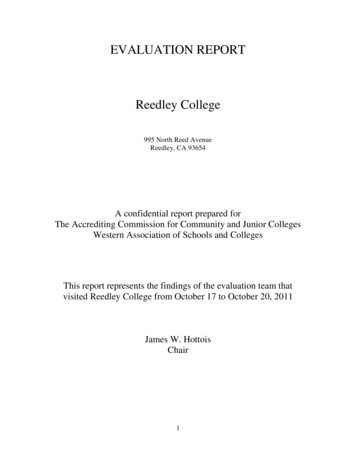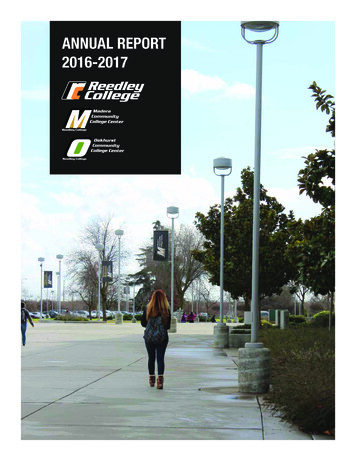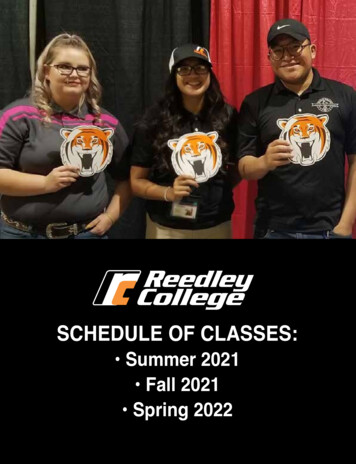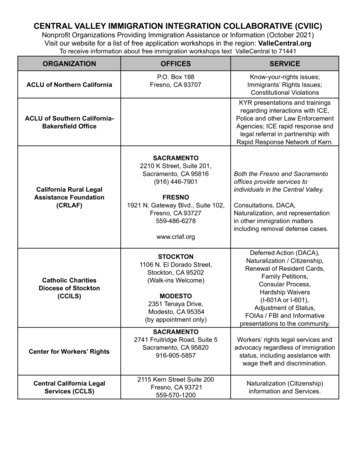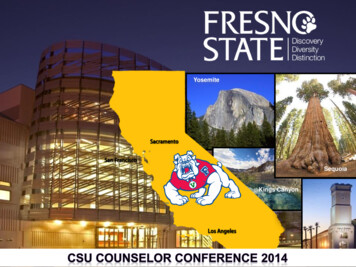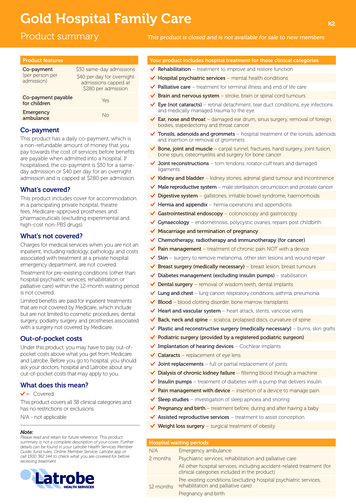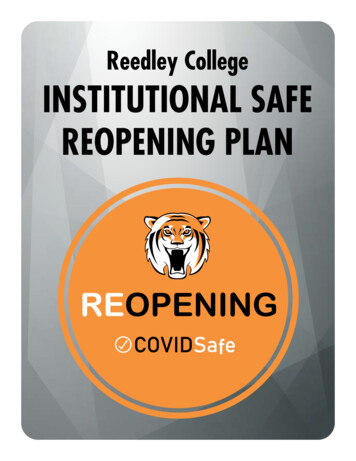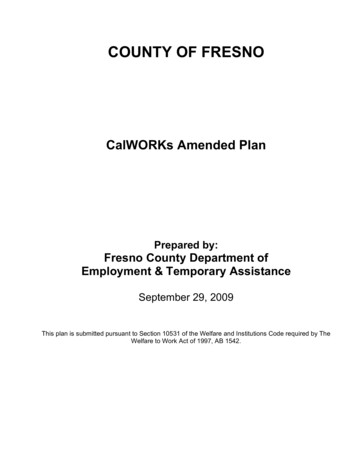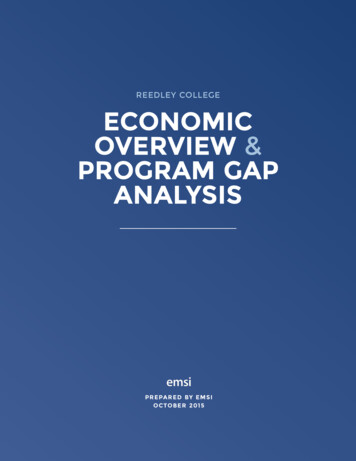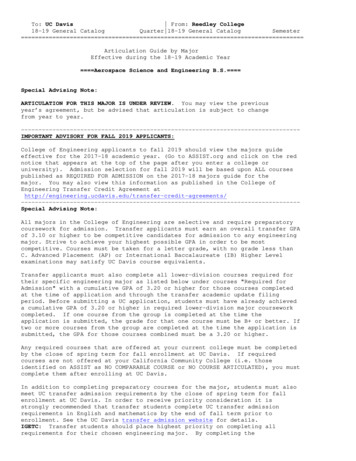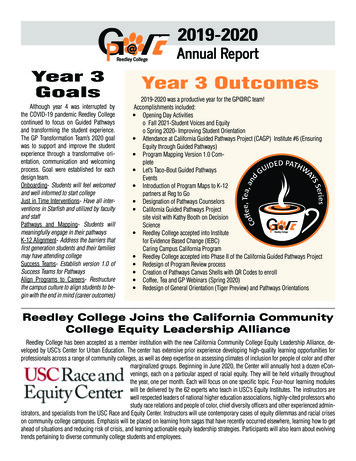
Transcription
GP@2019-2020Reedley College2019-2020 was a productive year for the GP@RC team!Accomplishments included: Opening Day Activitieso Fall 2021-Student Voices and Equityo Spring 2020- Improving Student Orientation Attendance at California Guided Pathways Project (CAGP) Institute #6 (EnsuringEquity through Guided Pathways) Program Mapping Version 1.0 CompleteIDED PATHW Let’s Taco-Bout Guided PathwaysGUEvents Introduction of Program Maps to K-12partners at Reg to Go Designation of Pathways Counselors California Guided Pathways Projectsite visit with Kathy Booth on DecisionScience@ Reedley College accepted into Institutefor Evidence Based Change (IEBC)Caring Campus California Program Reedley College accepted into Phase II of the California Guided Pathways Project Redesign of Program Review process Creation of Pathways Canvas Shells with QR Codes to enroll Coffee, Tea and GP Webinars (Spring 2020) Redesign of General Orientation (Tiger Preview) and Pathways OrientationseriesSSAYAlthough year 4 was interrupted bythe COVID-19 pandemic Reedley Collegecontinued to focus on Guided Pathwaysand transforming the student experience.The GP Transformation Team’s 2020 goalwas to support and improve the studentexperience through a transformative orientation, communication and welcomingprocess. Goal were established for eachdesign team.Onboarding- Students will feel welcomedand well informed to start collegeJust in Time Interventions- Have all interventions in Starfish and utilized by facultyand staffPathways and Mapping- Students willmeaningfully engage in their pathwaysK-12 Alignment- Address the barriers thatfirst generation students and their familiesmay have attending collegeSuccess Teams- Establish version 1.0 ofSuccess Teams for PathwaysAlign Programs to Careers- Restructurethe campus culture to align students to begin with the end in mind (career outcomes)Year 3 Outcomesffee, Tea, andCoYear 3GoalsGPReedley CollegeReedley College Joins the California CommunityCollege Equity Leadership AllianceReedley College has been accepted as a member institution with the new California Community College Equity Leadership Alliance, developed by USC’s Center for Urban Education. The center has extensive prior experience developing high-quality learning opportunities forprofessionals across a range of community colleges, as well as deep expertise on assessing climates of inclusion for people of color and othermarginalized groups. Beginning in June 2020, the Center will annually host a dozen eConvenings, each on a particular aspect of racial equity. They will be held virtually throughoutthe year, one per month. Each will focus on one specific topic. Four-hour learning moduleswill be delivered by the 62 experts who teach in USC’s Equity Institutes. The instructors arewell respected leaders of national higher education associations, highly-cited professors whostudy race relations and people of color, chief diversity officers and other experienced administrators, and specialists from the USC Race and Equity Center. Instructors will use contemporary cases of equity dilemmas and racial criseson community college campuses. Emphasis will be placed on learning from sagas that have recently occurred elsewhere, learning how to getahead of situations and reducing risk of crisis, and learning actionable equity leadership strategies. Participants will also learn about evolvingtrends pertaining to diverse community college students and employees.
A district approach to Guided PathwaysAs the colleges (Clovis, Fresno, Madera and Reedley) in theState Center Community College District began to implement GuidedPathways there was a realization that there needed to be strong collaboration between the colleges and the colleges and the district. Adistrict Guided Pathways Advisory Committee was established withmembership from faculty, staff and administrators at the colleges andthe district. The group which meets monthly identified 4 main areasof focus and collaboration.1. Technology2. Data3. Communication4. Professional DevelopmentThese areas were identified as the areas that were importantfor district wide discussion and potential alignment. The group firstcreated a work charge for the committee focused on “making studentscentral to all discussions and decisions” and makingsure that “equity is at the center” of all recommendations. The first recommendation of the group was toprovide professional development to district employees. The committee discussed the need for districtsupport to implement changes at the college but mostdistrict employees had not been involved in GuidedPathways. The decision was to bring in our CCCCORegional Coordinators to help facilitate training fordistrict employees. The three workshops were createdaimed at different groups and the different levels of understanding about Guided Pathways. The first workshop targeted district administrators and had the following three outcomes: 1)establish a shared understanding of GP and howit can transform a college and its culture to be student-centered, 2) develop GP purpose statement,and 3) contextualize GP to fit the needs and uniquecontext of SCCCD. The second workshop targeted district and collegeAdministrators and had the following three outcomes: 1) examine the importance of cross functional roles in guided pathways implementation, 2)examine the barriers students encounter with an equity lens, and3) identify the use of positional power to influence change. The third and final GP Workshop targeted the District GP Workgroup, composed of members leading GP across all four institutions. In this session, the outcomes were 1) modeling andpracticing a framework for having difficult conversations, 2)grounding the work in listening, and 3) completing the workgroup charge statement.The three workshops were successful with many district staffand employees increasing their understanding of Guided Pathways.According to the Regional Coordinators “Overall administrators andstaff that attended the session were excited to hear that there was aDistrict-wide team working in implementing Guided Pathways, andwanted to find out how they could be involved in the work.” The workshops also identified the critical need to include Human Resources indistrict guided pathways work.The District GP Workgroup also had intensive growth mindsettraining and re-reviewed the groups change statement re-writing itthrough a growth mindset and equity lens. This provided the workgroup with a common purpose and language. This work has createdopportunities for districtwide dialog is building much needed trustbetween colleges and with colleges and the district. The workgroupreviewed the outcomes of the trainings and decided to create 4 designteams to work on the four identified areas of 1) Technology 2) Data 3)Communication 4) Professional Development.
COVID-19Impact on GPIn March 2020 the COVID-19 crisistransformed the lives of community colleges, its faculty, staff, administrators andstudents. All classes were transitioned toremote education and everyone was placedunder “shelter in place” orders. This crisisderailed some of the GP@RC plans forthe Spring Semester but also showed thatGuided Pathways is even more important tosupport students during this crisis. After acouple of weeks of crisis management, theGP@RC teams roared back to life to focuson supporting students and addressingbarriers for students during the crisis. Thefoundation built by earlier GP@RC workand partnerships has been key to a quickresponse to COVID-19. Through the GP@RC work Reedley has built strong crossfunctional teams, actively addressed student barriers, purposefully addressed equitygaps and supported innovation in instruction and student services.GP@RC teams decided to continue towork on the 2019-2020 goal to re-inventand re-design student orientation and welcome week. The Transition Team met inMarch by Zoom and reviewed the designprinciples for General and Pathways Orientations. These were put in to a venn diagram to show the overlap. Each design teamwas then asked how they could support theorientations. There was also discussion ofhow the essential elements of the Generaland Pathways Orientations could be adapted for a potential online orientation due tothe crisis.Let’s Taco-bout GPAs part of outreach and communication efforts to include thevoices of faculty, staff and administrators into Guided Pathways efforts the College developed series of Let’s Taco-boutGuided Pathways events. Eachmonth during the fall semester a design team (Pathwaysand Mapping, Just-in-TimeInterventions, Student SuccessTeams) presented a topic andprovide a taco bar for all to enjoy.The first Lets Taco-bout Guided Pathways event was held onOctober 29, 2019. The first topic for discussion was ProgramMapping. The goal was to get the college communities impression/feedback on theproposed program maps.Attendees suggested additional topics for future Taco-Bout events including: roles ofpathways counselors, how students will select pathways, collaboration between instruction and student services, outreach to high schools, academic guidance, and OpenEducational Resources (OER).Pathways Counselors AnnouncedOne of the key themes we heard from students is that they wanted a single point ofcontact or SPOC. The Counseling Department took on this challenge. Collaborativelythey got together for a series of discussions to help develop an aligned understandingof counseling within a guided pathways framework. They created a powerful actionablevision of their essential work.“We promote proactive outreach efforts to support students in making informed choices as they select a pathway. We want mandatory campus orientation processes andmeaningful campus connections that engage students and integrate with guided pathways. We want an opt-out culture with systematic touch points that connect studentsto a clearly communicated, college wide network of services. We support preventativeand just-in-time interventions targeting individualized student needs. We promote aculture where student engagement outside of the classroom is required and a priorityfor students, faculty and staff. We encourage our faculty and staff to know who theirstudents are and to intentionally strive to create meaningful connections with them.”Using this vision counselor liaisons were designated for each of the 7 college pathways. They will work with a team to support students in those pathways in achievingtheir educational goals. Counselors across the college also collaborated to developa hierarchy to guide case management and outreach for following up with studentsthat were connected to multiple programs. Moving forward, counselors will continueto review and refine processes within this new framework while keeping the studentexperience at the center of discussions and decisions.
Coffee Tea and GPffee, Tea, andCoeriesSSAYIn order to keep the RC community engaged in Guided Pathways while remote the GP@RC design team set up weekly Coffee, Tea and GPwebinars inviting faculty, classified and administrators to meet together (on Zoom) and focus on one aspect of Guided Pathways with 50-70attendees per meeting.IDED PATHWApril 14, 2020—Program MonthsGUApril 21, 2020—Career Data and AssessmentApril 28, 2020—K-12 Partnership UpdatesMay 5, 2020—Pathways Success Teams and Data CoachingMay 12, 2020—General and Pathways OrientationsGP@The outcomes of these webinars will be used by design teams to continue their GP@RC work.Reedley CollegeWelcome to yourPathwaysContinuing the work of involving the entire college inthe work of Guided Pathwaysthe January 2020 opening daywas centered around guidedpathways and improving thestudent experience. The entirecampus was closed for 4 hoursin the morning so all faculty,staff, and administrators couldattend the event. The goal of theday was to have groups start towork together in their pathwayswith a focus on improving theonboarding and welcoming experience of our students for Fall2020. As faculty, staff and administrators arrived they were given colored lanyards that reflected their assigned pathways. These were used laterin the morning to facilitate breakout rooms for each pathway.
Guest Speaker:Dr. Daniel WalkerEvaluations of previous opening days revealed thatthe attendees wanted to start the semester with a motivational speaker. Dr. Daniel Walker from El CaminoCollege, is a recognized scholar, filmmaker, and author.He shared with the college his passion for social justiceand educational reform. He spoke about the importanceof education in his own story. He also spoke about hismother whose community college education changedtheir family’s path. Dr. Walker dynamically called forequity and social justice to be at the heart of all thecolleges work.“He really put the meaning of Guided Pathways intoperspective and just motivated us.”Redesigning Program Review in aGuided Pathways FrameworkAs part of evaluating systemic structures Reedley College reviewed andcompletely revised its Program Review process. As Program Review plays acritical part in program evaluation and student success the college decidedto recommend a two-year program review process, replacing a 6-year cycle.With the idea of being nimbler and more proactive the college began developing a new handbook and templates for instructional, student service, andadministrative service programs. The new process approved in March 2020is student and equity focused. The process was streamlined and encouragesprograms to review their program in an equity framework, make systemicchanges and evaluate the short term and long-term impacts. The collegesnew data coaches will help facilitate these conversations. All RC Programswere spilt into two groups and the new process will begin in Fall 2020.Hobsons Starfish UpdateReedley College has been using Starfish for Early Alert and Degree Planner since Fall 2018 and has been expanding on its usage over the past several academic years. Early Alert was utilized during the COVID-19 onlinetransition to connect faculty, students, counseling, and support services withrelevant information, resources, and outreach. During the 19-20 academic year, Pathway organizations were set up in Starfish, which allowed forcounseling by Pathways to be planned. Reedley College counselors beganusing Starfish for counseling appointments during Summer 2020 and willbe opening up counseling by Pathways in Fall 2020. Starfish will facilitateefficient information sharing between counselors General Counseling, Pathway Counseling and Special Program counselors. Students will experiencepathway connections in Starfish via Pathway Specific services based on theirmajor and the pathway it is associated with. During the 2020-21 academicyear further, resources and training will be provided for faculty, staff, andstudents to assist all in effectively using the Starfish platform.Applied Education and Title VReedley College was awarded a 3 Million Title V Hispanic Serving Intuition (HIS) Grant from the US Department of Education. Aligned with thegoals of Guided Pathways the grant will expand student career explorationusing an applied learning model which encourages students to apply to theknowledge they learned in their courses to real-life applications. The grantwill support students with access to research and job placement learningexperiences. The goal of the grant is to increase persistence, degree andcertificate completion and the transfer rates to four-year institutions.RC Accepted into CAGP Phase IIAfter successfully completing Phase I of the California Community College Project Reedley College was accepted into Phase II or CAGP 20202022. Reedley College will have will have an opportunity to continue theirparticipation via a new three-year experience that builds on the college efforts to date and explores additional core components of institutional changeand guided pathways design/implementation. The project will include four1.5-day institutes from Spring 2021 to Fall 2022, coaching support and local site visits.
Caring CampusReedley College has been accepted into the Caring Campus Initiativeproject created by the Institute for Evidence Based Change (IBEC). Theinitiative is designed to create a positive, supportive campus culture and toincrease students’ sense of connectedness to the college through the development of student-centered behaviors and activities among faculty andstaff. The initiative aligns with the guided pathways goal of increasing thelikelihood that students will learn and persist. The training is focused forclassified professionals. Coaches train staff on ways to increase studentconnectedness to the college by changing how they interact with studentsand developing strategies that help students feel at home in college.Program Mapping Complete andReg to GoIn early fall the Reedley College team completed version 1.0 of thecollege’s program maps. After 51 mapping workshops with over 359 attendees including discipline experts, counselors, classified staff and administrators 140 different program maps were completed. Teams workedtogether to create a semester by semester plan for each program as wellas potential aligned transfer programs and/or careers. In Spring 2020 themaps were used by counseling and outreach to help student register forFall 2020.Data CoachesReedley College is planning for 8 data coaches starting in Fall 2020.A Data Coach helps departments and student successteams in analyzing and using student outcomes datato inform their planning and improvement efforts. Thedata coaches will also support programs completingthe new program review process and be able to facilitate discussion on equity in each program with the goalof supporting our students. Each Data Coach is required to take a 4-week intense Data Literacy Certificatecourse during Summer 2020. The first cohort of 30students signed up for the first data class with math instructor Julie Kehoe and assisted by Janice Offenbach,Director of Research, Evaluation and Planning and Darlene Murray, Equity Coordinator.Success TeamsDuring the 2020-2021 year the Success Team DesignTeam worked on the creation of Success Teams and ledthe efforts to plan the Fall 2020 pathway orientations.To do that, RC created descriptions for each successteam member, including back-end team members andstudent facing team members. They then hosted anopening day workshop in Spring 2020 to identify thefocus of the pathway orientations by asking faculty andstaff what they thought were the key things all of ourstudents should know. The group recruited an initialteam to begin planning the orientation for their specificpathway that integrated the key points and takeawaysfrom that opening day session.While working on identifying our Success Teammembers, RC was were simultaneously developing aData Coaching Course that would be critical for theSuccess Team. RC worked on identifying who wouldofficially become a data coach for each pathway as wellas identified the additional success team members byrecruiting Lead Faculty and Lead Counselors from thepathway orientation planning teams. To complementthe rollout of Success Teams, they created shells withinCanvas for each pathway. Finally, we secured MelindaKarp as our Fall 2020 Keynote speaker. Melinda willhelp our college understand the research and intentions behind our redesign for student success as wellas work with each success team to help them understand they role they’ll play as Success Team membersin making the required and significant changes.
Welcoming our Students through Improved OrientationsThe RC Transformation team identified its 2020 goal to redesign the onboarding and welcoming experience of our students for the Fall2020 semester. This includes re-imagining our college orientation. For the second part of the morning everyone was broken out into theirassigned pathways. Pathways were each assigned a room. In that room the newly announced Pathways Counselors as well as members of theTransformation Team facilitated a discussion to address several questions: 1) What things do all students need to know; 2) What do studentsin your pathway specifically need to know; 3) What kind of successful activities have you used to promote student engagement; 4) How can weintegrate continuing students into Pathways. Data from these groups was aggregated together and 7 themes emerged to guide the re-design oforientation;1. Need for an early career/pathways connection2. Understanding of the rigor of college and the differences in expectations than high school3. Students connection to faculty, staff, administrators in theirpathways through success teams4. Knowledge of all college resources including instructional, student support as well as basic needs5. Hands on experience with college technology6. Inclusion of second year students as panels, mentors, ambassadors
QR Codes and Pathway Canvas CoursesIn order to engage students in their pathways and provide them consistent messaging and information Reedley College has created Pathway Courses in Canvas for each of our 7 pathways. The shells willcontain general orientation content for all students, as well as Pathwayspecific information including topics covered during the pathway orientation such as “Getting to Know Pathway Faculty”, and the “Pathwayto Career Connection”. Students can add into these pathways by usinga QR code. In the Courses students will be able to interact with eachother, their instructors, and their success teams. Information about eachpathway and general information about the college will be housed in thePathways Canvas course. Success Team members can use the features of canvas to send out information to students, invite them to pathwaysactivities and remind them about important upcoming dates or deadlines.Looking forward to Guided Pathways Year 4August 2020 is the official launch of Reedley College Guided Pathways Version 1.0! Additional Plans for Fall 2020 include Implement redesigned online Tiger Preview (Orientation) and new Pathways Orientations Melinda Karp Opening Day Speaker —Redesigning Student Support & GP themed online Flex Day GP/Equity themed Coffee, Tea and GP Webinar Series Implementation of Data Coaches and Success Teams Starfish (expansion) including scheduling, intake survey and analytics Alignment of Guided Pathways Program Maps and Dual Enrollment Pathways Website redesign through Guided Pathways frameworkGP@Reedley CollegeIf you have questions or want to learn more about Guided Pathwayscontact the Reedley College CORE Guided Pathways Team:Janice OffenbachStephanie CurryRenee Craig-MariusDarlene MurrayJerry BuckleyMelanie HighfillDiana RodriguezSamara Trimble
contact or SPOC. The Counseling Department took on this challenge. Collaboratively they got together for a series of discussions to help develop an aligned understanding of counseling within a guided pathways framework. They created a powerful actionable vision of their essential work.
